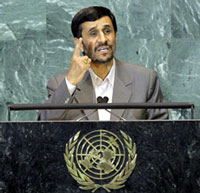Ahmadinejad’s ‘wipe Israel off the map’ myth debunked (05-26-2007)
![]() Web Video: President Mahmoud Ahmadinejad UN Address (09-23-2008)
Web Video: President Mahmoud Ahmadinejad UN Address (09-23-2008)

UNITED NATIONS (FinalCall.com) – The 15-member UN Security Council recently voted unanimously for UN Resolution 1835 (2008), which called on Iran to “fully” and “without delay” comply with the council’s demand to end its nuclear enrichment program. The Security Council agreed with the assessment by the head of the International Atomic Energy Agency that Iran may not have suspended enrichment related activities.
Speaking to the IAEA’s board of governors in Geneva, Switzerland Sept. 22, the agency Director General Mohamed ElBaradei said, the IAEA had not made substantial progress verifying Iran’s so-called studies into possible weaponization programs, which remain of “serious concern.”
Mr. ElBaradei wants additional authority to visit sites and to access additional documents.
The Security Council reaffirmed Resolution 1835 on Sept. 27 and its commitment within the framework to a negotiated solution on the Iranian nuclear issue.
The foreign ministers of the United States, Britain and France issued a statement saying they were delaying a vote on a resolution proposing on new sanctions against Iran until November. The delay was prompted by concerns voiced by Russia, China and Germany. The Russian Federation, through Foreign Minister Sergei Lavrov, said the time was not right for talk of new sanctions. The Russian foreign minister also said in a statement that America and Europe were overstating Iran’s nuclear program.
On Sept. 28, Iran responded to the UN resolution and possible sanctions. Iran’s Secretary of the Supreme National Security Council Saeed Jalili said it was not a constructive approach and would not help resolve the issue. “A new UN Security Council resolution would cause ‘mistrust’ and will not contribute to global peace and security,” said Mr. Jalili, according to the Tehran Times and Iran-Daily.
George Perkovich, an expert on Iran’s nuclear program for the Carnegie Endowment for International Peace, argued in the Sept./Oct. issue of Foreign Relations magazine that the United States and its negotiating partners should set “a deadline” for Iran to agree to negotiations on suspending its nuclear enrichment program. If Iran still refuses to talk, he said, the U.S. and its partners “should pull all previous incentive offers from the table and seek tougher sanctions; but not military force.”
“The threat of sanctions have no effect on the Iranian people,” President Mahmoud Ahmadinejad told reporters at a Sept. 23 press conference after his address to the General Assembly. The IAEA had said in 12 official reports that the activities of Iran were, indeed, peaceful he told reporters. “But despite the fact that the (IAEA) agency had verified that there were no documents indicating that Iran’s nuclear activities were not peaceful, the United States and the European Union were consistently alleging that Iran was continuing on a military path,” he said.
He told the UN press corps that IAEA should stop responding to allegations.
The next night, in a live interview President Ahmadinejad told CNN talk show host Larry King the nuclear issue regarding Iran “is a highly politicized one.”
“The largest number of inspections in the history of the IAEA has been done in Iran. We have offered the IAEA the largest number of documents in its history,” President Ahmadinejad told Mr. King.
Mr. ElBaradei did in fact tell the IAEA governing board that he was asking for additional time for his investigation because “some countries” contend Iran’s nuclear program is driven by “military ambitions.”
Reporters at the UN–as did Mr. King–pressed the Iranian president to respond to the status of U.S./Iranian relations. Mr. Ahmadinejad told the UN press corps Iran was in favor of reason and dialogue, but it would not accept the language of force.
Mr. King noted that there was “hostility” evident between the two nations. “Do you think you can make steps forward in that regard?” Mr. King asked.
“Of course, the hostility has not been from our end, we have always been interested in having friendly relations,” President Ahmadinejad said. He said a letter had been sent to the American president asking for time to talk at the United Nations, which could be the fresh start in relations.
Five former U.S. secretaries of state urged talks with Iran at a recent forum at George Washington University and taped for broadcast on CNN. Colin Powell, Madeleine Albright, Warren Christopher, James Baker and Henry Kissinger said engaging Iran is important because Washington’s military options against Iran are “unsatisfactory.”
Mr. Perkovich said talking to Iran was “a great idea.” “We should always be willing to talk or negotiate with adversaries,” he said.
The Christian Science Monitor reported Sept. 9 that a “clear solution” to the Iranian nuclear issue at the UN “is far in the future” but the Iranians need an immediate solution to power shortages. “Rising electricity consumption and a drought have led to power shortages” for “two to four hours a day during peak hours,” said the Christian Science Monitor.
Related links:
- Ahmadinejad’s ‘wipe Israel off the map’ myth debunked (05-26-2007)
 Web Video: President Evo Morales Press Conference (UN, 09-23-2008)
Web Video: President Evo Morales Press Conference (UN, 09-23-2008)- Iranian President Ahmadinejad’s 2008 UN Address (FCN, 09-23-2008)
- World community backs Iran’s nuclear energy program (09-14-2008)
- Text of Iranian President Ahmadinejad’s letter to President George W. Bush (05-09-2006)












